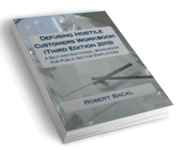Comparing Government Customer Service, Then and Now
Nobody thinks of government as customer oriented. Really it's the opposite. Most people think government is terrible at customer service and blame the system, or lazy, dumb employees.
There's some reasons for this. Government HAS BEEN (past tense) terrible at customer service, so part of the reputation is based on that history. Second, people want government to protect them from their neighbours, but nobody likes to have government regulate THEM. They confuse customer service with getting what one wants.
Third is the role of the media, who have an important role in watchdogging government. Unfortunately, they are far more likely to report the bad apples in government, and not all the dedicated people doing good deeds.
But We Forget How Bad It ONCE WAS
Because of the general dislike of government, it's easy to not notice how much better government has become in making things easier, more convenient, and simply better for those that use its services. So, here are some reminders.
Then: Imagine a system where the ONLY way to renew your driver's licence was to line up with everyone else, spend an hour or two watching surly employees process applications, and generally get hugely frustrated. Sounds like the Model T ages, but that's what it was like in the 80's and 90s'. Not only that, but the systems were terribly set up, often with renewals flooding in at the end of the month, because the licences and plates expired at the end of months. Then the lineups went around the building.
Now: Most jurisdictions allow you to conduct your renewals from home, on the Internet, or through the mail. No lineups for "standard" situations. A huge improvement.
Not only that but the motor vehicle folks finally caught on to the fact that plates and licences should not expire at the end of each month, but on different dates within a month (often a birth date). That means that there isn't a rush on the last day of each month, so if you have to stand in line, it's much shorter, and while some employees are still surly and impersonal, reducing the pressure of the rush seems to have helped.
Then: To get information from government, you had to go in person, let's say to the IRS, and get the pamphlets you thought you'd need. Then you'd have to make sense out of them, a task not for the faint hearted.
Now: Now, huge numbers of informational publications are available on the Internet. Mind you, if they're incomprehensible on paper, they're going to be hard to understand if you download them, but at least, you don't have to spend hours making special trips to government offices, then have to go back, because you didn't get what you needed.
Then: Governments seem to have always required form after form to be filled out, and perhaps that's still the case. And filling out those forms correctly is hard because the documentation is not always citizen friendly. You would have to get the forms, fill them out, and mail them in, or bring them in, and then wait what seemed like forever to get a response teling you forget to fill out section X.12.A.
Now: Many governments now have forms online in PDF format that actually allow you to fill out the form on your computer, save it, then email it to the government office. That may not free one from the jargon, and delays waiting, but it's better.
Then: Many of the improvements have come from the use of technology, and that's great but it's not the only reason things are better now. Governments ARE becoming more customer centric, particularly in areas where complex systems can impact on the local economies.
Now: While it is the exception rather than the rule, governments are streamlining citizen processes to cut wait times, particularly for things like construction permits, or land title issues. For example, a few jurisdictions have allowed for much faster approval of certain types of construction permits -- having a few new windows installed shouldn't require the same approvals and delays as would be the case for building a new structure.
One land title office I know had a backlog of at least a year to process requests, something that caused huge problems for everyone, and lead to their staff being under constant verbal abuse. Recognizing this, they took steps to a) relieve the backlog and b) ensure it didn't repeat.
Conclusion
I don't live in La-La land here, because there will always be room to improve. There's a far way to go. But next time you complain about the poor service you think you are getting for government, remember that it IS much better than it was.
